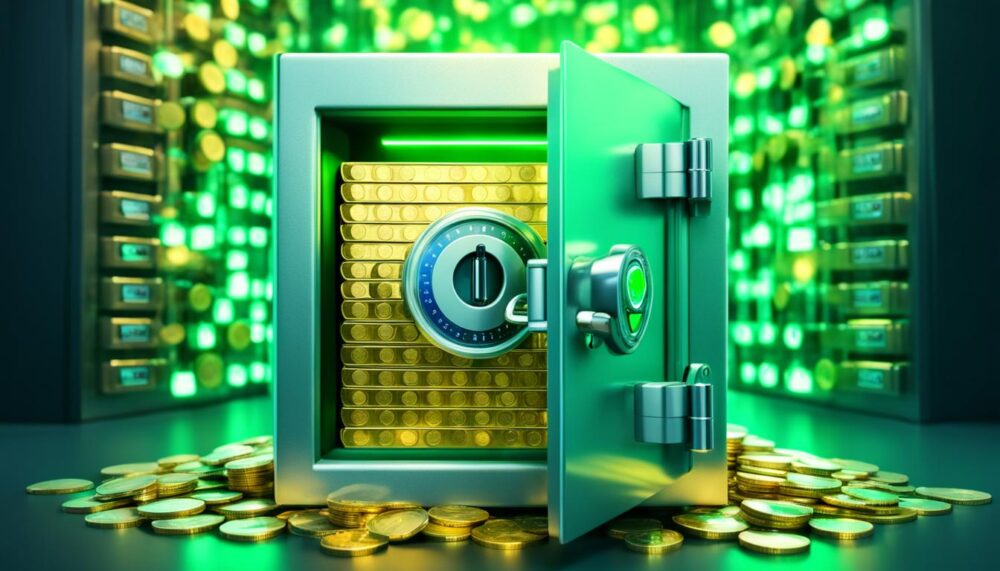Managing your crypto assets securely is of utmost importance in today’s digital landscape. As technology continues to advance, so do the risks and vulnerabilities associated with cryptocurrency asset management. It is crucial for us to take proactive measures to protect our investments and ensure the safety of our digital assets.
Like many others, I have experienced the excitement and thrill of entering the world of cryptocurrencies. The potential for high returns and financial independence is alluring. However, with this excitement comes the responsibility of managing our crypto assets securely. It is essential to be proactive and stay ahead of potential threats to safeguard our hard-earned investments.
When it comes to managing your crypto assets securely, there are key tips and tricks that can help protect your investments and give you peace of mind. By implementing these best practices, you can navigate the crypto space with confidence and security.
Key Takeaways:
- Use secure digital asset storage solutions to safeguard your private keys.
- Consider using hardware wallets for offline storage of your cryptocurrencies.
- Implement multi-factor authentication for added security.
- Stay updated on the latest security threats and review your security measures regularly.
- Diversify your crypto portfolio to reduce the risk of losing all your assets.
Best Practices for Crypto Security
When it comes to protecting your cryptocurrency holdings, following best practices for crypto security is essential. By implementing these measures, you can safeguard your crypto portfolio and minimize the risk of potential threats. Here are some key strategies to consider:
- Diversify your crypto portfolio: Spreading your investments across different cryptocurrencies helps mitigate the impact of a security breach in one particular currency. By diversifying, you reduce the risk of losing all your assets.
- Regularly update your wallet software: Keeping your wallet software up to date is crucial for maintaining optimal security. Developers frequently release updates that address any vulnerabilities or weaknesses in the software.
- Use strong, unique passwords: Creating strong and unique passwords for each of your crypto accounts adds an extra layer of protection. Avoid using common phrases or easily guessable passwords.
- Be cautious of phishing attempts: Phishing is a common tactic used by hackers to steal sensitive information. Always be vigilant and double-check the authenticity of websites or emails before providing any personal or financial details.
- Access crypto accounts through secure platforms: Only use verified and secure platforms to access your crypto accounts. Ensure the websites you visit have proper security measures in place, such as SSL encryption.
- Utilize cold storage options: Cold storage involves storing your cryptocurrency offline, away from potential digital threats. Hardware wallets, such as Trezor or Ledger, provide a secure offline storage solution for your private keys.
- Create offline backups: It’s crucial to regularly create offline backups of your cryptocurrency holdings. This provides an additional layer of protection in case of hardware failures or other unforeseen circumstances.
To further illustrate the importance of these best practices, here’s a table comparing various security measures:
| Security Measure | Advantages | Disadvantages |
|---|---|---|
| Diversifying Crypto Portfolio | Reduces risk by spreading investments Minimizes potential losses from a single currency breach |
Potential decrease in overall portfolio performance if one currency performs exceptionally well |
| Regularly Updating Wallet Software | Addresses vulnerabilities and enhances security Ensures compatibility with the latest features |
Requires time and effort to keep up with updates |
| Using Strong, Unique Passwords | Increases resistance against password cracking attempts Avoids potential unauthorized access |
Requires remembering or securely storing multiple complex passwords |
| Beware of Phishing Attempts | Minimizes the risk of falling victim to scams Protects sensitive information from being compromised |
Requires heightened awareness and caution |
| Access Crypto Accounts through Secure Platforms | Reduces the risk of account hijacking or unauthorized access Provides a secure environment for transactions |
Limitations based on platform availability |
| Utilizing Cold Storage Options | Enhanced security by keeping private keys offline Protection against online hacking attempts |
Requires physical access to the hardware wallet |
| Create Offline Backups | Provides redundancy and protection against hardware failures Ensures access to funds in case of emergencies |
Requires careful storage and safekeeping of backups |
Remember, protecting your cryptocurrency holdings is of utmost importance. By incorporating these best practices into your crypto security strategy, you can enhance the safety and security of your digital assets.
Secure Crypto Storage Solutions
When it comes to protecting your cryptocurrency holdings, secure crypto storage solutions are crucial. With the increasing number of security threats in the crypto space, using reliable storage options is essential to safeguard your investments. Here, we explore two popular secure storage solutions that can help ensure the safety of your crypto assets.
Hardware Wallets
Hardware wallets, such as Trezor or Ledger, provide offline storage options for your cryptocurrencies. These wallets keep your private keys offline, away from potential hacking attempts. By storing your keys on a separate device, you minimize the risk of being exposed to online threats. In addition, hardware wallets typically require physical confirmation for transactions, adding an extra layer of security.
Using a hardware wallet is simple. Just connect the device to your computer or mobile device, enter your PIN, and confirm the transaction on the device itself. This process ensures that your private keys never leave the wallet, making it extremely difficult for hackers to gain unauthorized access.
Paper Wallets
If you prefer a more traditional approach, paper wallets offer another secure storage option. Using a paper wallet involves generating a QR code or printing a copy of your private keys, which you can then store in a safe or another secure location. Since paper wallets are offline, they are immune to online threats such as hacking or malware attacks.
Creating a paper wallet is relatively simple. You can generate a paper wallet using various online tools. Once generated, print out the wallet and keep it in a secure place. However, it’s important to note that paper wallets can be vulnerable to physical damage or loss, so it’s essential to keep multiple copies or consider laminating the wallet for added protection.
Remember to securely store your hardware wallets or paper wallets and keep them away from prying eyes. Regularly back up your wallets and ensure you have contingency plans in case of loss or damage.
Here is a brief comparison of the two secure storage solutions:
| Secure Crypto Storage Solution | Pros | Cons |
|---|---|---|
| Hardware Wallets |
|
|
| Paper Wallets |
|
|

It’s important to research and carefully choose a secure storage solution that aligns with your specific needs and preferences. Consider factors such as ease of use, compatibility with your cryptocurrencies, and the level of security provided. By utilizing secure crypto storage solutions, you can have peace of mind knowing that your cryptocurrency holdings are protected from potential threats.
Conclusion
Managing your crypto assets securely is essential for effective cryptocurrency asset management. By following best practices for crypto security and utilizing secure digital asset storage solutions, you can protect your cryptocurrency holdings and minimize the risks associated with the volatile crypto market.
To safeguard your investments, it is crucial to stay updated on the latest security threats and consistently review and enhance your security measures. This includes safeguarding your private keys, utilizing hardware wallets for offline storage, and implementing multi-factor authentication for an extra layer of protection.
Additionally, diversifying your crypto portfolio helps mitigate the risk of losing all your assets if one cryptocurrency experiences a security breach. Regularly updating your wallet software, using strong and unique passwords for each account, and being cautious of phishing attempts are also recommended best practices for crypto security.
Remember, there are various secure crypto storage solutions available, such as hardware wallets like Trezor or Ledger, or paper wallets that offer offline storage options. Research and choose a storage solution that aligns with your specific needs and preferences to ensure the safety and security of your cryptocurrency holdings.

